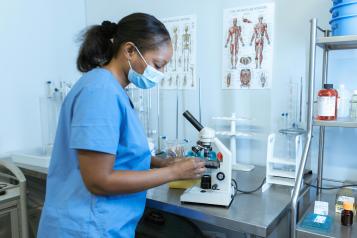Sharing your experiences has made healthcare better for people with a learning disability

What are Annual Health Checks?
Annual Health Checks are for people aged 14 years or over with a learning disability. They are provided by GP practices with the purpose of reducing premature mortality and improving the health outcomes of people with learning disabilities. You can find more information and tools to support you with an Annual Health Check here.
In August 2020, we published our findings on how the quality and uptake of Annual Health Checks was working, and what could be better. We made 15 recommendations to providers and commissioners, based on feedback shared directly from people with learning disabilities and carers. These recommendations focused on improving awareness, information, quality, support and choice. You can read the initial responses to these recommendations here.
Earlier in 2021, our local Learning Disability Review of Mortality (LeDeR) published its Annual Report, which includes a number of actions that further address the recommendations in our report.
Key actions from the Learning Disability Nursing Service include:
- A new approach to support GP practices with the uptake and quality of Annual Health Checks. This approach emphasises the shared responsibility between the GP, patient, carers and family and friends for noticing changes in health needs.
- Creation of additional resources such as an updated Carer Preparation Tool, a training video on how to use the Carer Preparation Tool, and Health Action Plan resources for GPs.
- Supporting a new project to increase health resilience and the uptake of Annual Health Checks in children and young people.
- Working with the 0-25 service to create a pathway from children services to adult services. Differences in terminology has often resulted in young people not being identified as eligible for the GP Learning Disability register, so a new tool has been developed to support professionals, mainstream and specialist schools, colleges and parents.
Key actions from the Clinical Commissioning Groups (CCGs) include:
- Both CCGs have focused on increasing the number of people identified as having a learning disability and ensuring GP Learning Disability registers are accurate.
- Herts Valleys CCG achieved an 83% completion rate for Annual Health Checks, and East and North Herts CCG achieved 69%.
The LeDeR Annual Report includes priorities for the next year, which also look to address recommendations made in our report:
- Improving the quality of Annual Health Checks and how this could be audited.
- Improving the uptake of Annual Health Checks in patients from ethnically diverse communities.
- Creating a Carer Preparation Tool for people aged 14-25 with an emphasis on younger health indicators.
- Providing support to all GP practices across Hertfordshire, offering shadowing training, training videos and other supporting tools.
- Measuring the increase in the uptake of Annual Health Checks and gathering evidence of the health indicators identified using the Carer Preparation Tool and other resources linked on the Hertfordshire County Council website.
The Hertfordshire County Council Integrated Care Team recently asked for feedback from people with learning disabilities. This feedback will be used to update the Action Plan which is part of the Big Plan for Adults with Learning Disabilities.


